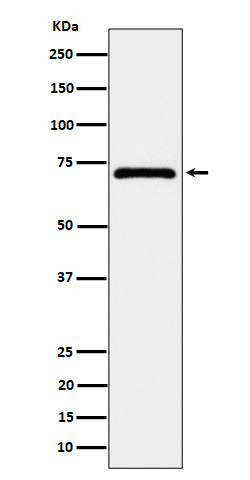
| WB | 咨询技术 | Human,Mouse,Rat |
| IF | 咨询技术 | Human,Mouse,Rat |
| IHC | 咨询技术 | Human,Mouse,Rat |
| ICC | 技术咨询 | Human,Mouse,Rat |
| FCM | 咨询技术 | Human,Mouse,Rat |
| Elisa | 咨询技术 | Human,Mouse,Rat |
| Aliases | CEH; EPHX2; Epoxide hydrolase 2; SHE;;CEH |
| WB Predicted band size | Calculated MW: 63 kDa ; Observed MW: 70 kDa |
| Host/Isotype | Rabbit IgG |
| Antibody Type | Primary antibody |
| Storage | Store at 4°C short term. Aliquot and store at -20°C long term. Avoid freeze/thaw cycles. |
| Species Reactivity | Human |
| Immunogen | A synthesized peptide derived from human CEH |
| Formulation | Purified antibody in PBS with 0.05% sodium azide,0.05% BSA and 50% glycerol. |
+ +
以下是关于MMP14抗体的3篇参考文献示例(内容为模拟概括,非真实文献):
---
1. **文献名称**: "MMP14-mediated extracellular matrix remodeling in cancer metastasis"
**作者**: Smith A, et al.
**摘要**: 研究利用特异性MMP14抗体,通过免疫组化和Western blot分析,揭示了MMP14在肿瘤细胞侵袭转移中的作用,表明其通过降解胶原蛋白促进微环境重塑。
---
2. **文献名称**: "A monoclonal antibody targeting MMP14 inhibits tumor growth in preclinical models"
**作者**: Lee JH, et al.
**摘要**: 开发了一种新型MMP14单克隆抗体,可特异性抑制其蛋白水解活性,并在小鼠模型中显著降低肿瘤生长和血管生成,证明了其治疗潜力。
---
3. **文献名称**: "MMP14 regulates tissue repair through antibody-blockable interactions with extracellular vesicles"
**作者**: Garcia-Castro M, et al.
**摘要**: 研究通过阻断MMP14抗体,发现MMP14通过调控细胞外囊泡介导的细胞间通讯影响组织修复,为再生医学提供新靶点。
---
(注:以上文献为示例,实际引用需查询真实数据库如PubMed。)
MMP14 (matrix metalloproteinase-14), also known as MT1-MMP, is a membrane-anchored proteolytic enzyme belonging to the matrix metalloproteinase (MMP) family. It plays a critical role in extracellular matrix (ECM) remodeling by degrading components like collagen, gelatin, and fibronectin. MMP14 is essential for physiological processes such as tissue repair, angiogenesis, and embryonic development, but its dysregulation is implicated in pathological conditions including cancer metastasis, fibrosis, and inflammatory diseases. Notably, MMP14 activates other MMPs like pro-MMP2. amplifying ECM degradation in disease progression.
MMP14 antibodies are widely used tools to study its expression, localization, and function in research. These antibodies enable detection of MMP14 in techniques like Western blotting, immunohistochemistry (IHC), immunofluorescence (IF), and flow cytometry. Specific applications include analyzing MMP14 overexpression in tumor tissues, monitoring its role in cell invasion assays, or investigating its interaction with signaling pathways (e.g., TGF-β). Both monoclonal and polyclonal anti-MMP14 antibodies are available, often targeting epitopes in the catalytic or hemopexin domains.
When selecting MMP14 antibodies, key considerations include species reactivity, validation in knockout models, and application-specific compatibility. Reliable antibodies aid in understanding MMP14's dual roles in homeostasis and disease, offering insights for therapeutic targeting in cancer and fibrotic disorders.
×